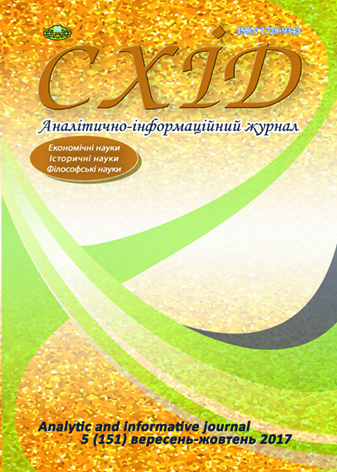The philosophy of artificial consciousness in the first season of TV series 'Westworld'
DOI:
https://doi.org/10.21847/1728-9343.2017.5(151).117438Keywords:
artificial consciousness, artificial intelligence, consciousness, science fiction, television, thought experimentAbstract
The study analyzes the philosophy of artificial consciousness presented in the first season of TV series 'Westworld' and as a result of the analysis shows the collision of two opposite philosophical views on consciousness and the possibility of creation of artificial consciousness from the standpoint of two characters of TV series - Arnold Weber and Robert Ford. Arnold Weber proceeds from two philosophical assumptions: consciousness really exists (1) and human consciousness can be a prototype for modeling consciousness in an artificial intelligence bearer (2). And he has to choose: either to pick out one of the already existing conceptions of consciousness to implement the emergence of artificial consciousness within artificial intelligence or to invent his own; Arnold Weber chooses the Julian Jaynes' conception of consciousness as a basis for artificial consciousness what means that artificial consciousness must have the following features: 1) artificial consciousness has to be the result of the breakdown of the bicameral mind (apparently, modeled within artificial intelligence), the state of mind in which cognitive functions are divided into two part, a 'speaking' part and 'hearing' ('obeying') part, until the breakdown that makes the bicameral mind the unified mind; 2) artificial consciousness has to be a mind-space based on language and characterized by introspection, concentration, suppression, consilience and an analog 'I' narratizing in the mind-space. Robert Ford believes that consciousness does not exist at all and that there are only stories (narratives) which human beings and artificial beings, modeled in the image and likeness of human beings, tell each other and always the basis of all those stories (narratives) is suffering.
Downloads
References
Rayhert, K. W. (2017). Cyborg as a Cyborgizated Human Being: The Philosophical Thought Experiment in Film ‘RoboCop’ (2014). Skhid, №4, pp. 98-104 (ukr). DOI:10.21847/1728-9343.2017.4(150).111564.
Rayhert, K. W. (2017). The Review of Julian Jaynes’ Conception of Consciousness. Skhid, №2, pp. 96-99 (ukr). DOI:10.21847/1728-9343.2017.2(148).102813.
Andreeva, N. (2016). ‘Westworld’ Finale Hits Season High, Caps Most Watched First Season Of HBO Series, available at: http://deadline.com/2016/12/westworld-finale-ratings-season-high-drama-most-watched-hbo-first-season-series-1201864657/
Belvedere, B. (2016). Westworld Doesn’t Understand the Nature of Consciousness, available at: https://thearcmag.com/westworld-doesnt-understand-the-nature-of-consciousness-1865645cc1b6#.5lt3z3vrp.
Campbell, J. (1949). The Hero with a Thousand Faces. Princeton, NJ: Princeton University Press.
Doty, M. & J. P. Searle (2016). ‘Westworld’ Premise Refuted: Why the Robots Can’t Be Conscious, available at: http://www.thewrap.com/westworld-premise-refuted-why-the-robots-cant-be-conscious/
Jaynes, J. (1986). Consciousness and the Voices of the Mind. Canadian Psychology, №2, pp. 128-148. DOI: 10.1037/h0080053.
Jaynes, J. (2000). The Origin of Consciousness in the Breakdown of the Bicameral Mind. Boston; New York: A Mariner Book.
Jones, E. (2016). The Android Manifesto: Finding Marx in Westworld, available at: http://inthesetimes.com/article/19728/karl-marx-in-westworld-android-manifesto-trump-false-consciousness?utm_content=buffered16b&utm_medium=social&utm_source=f acebook.com&utm_campaign=buffer
Johnson, J. (2017). The Philosophy of Westworld, available at: https://omni.media/the-philosophy-of-westworld
Koch, Ch.(2004).The Quest for Consciousness: A Neurobiological Approach. Englewood: Roberts and Company.
Locke, J. (1998). An Essay Concerning Human Understanding. London: Penguin Classics.
Nussbaum, E. (2016). The Meta-Politics of “Westworld”, available at: http://www.newyorker.com/magazine/2016/10/24/the-meta-politics-of-westworld
Patches, M. (2016). Why the Bicameral Mind Theory Is Crucial to Unlocking “Westworld”, available at: https://www.thrillist.com/entertainment/nation/westworld-bicameral-mind-theory-real
Perigard, M. (2016). ‘Westworld’ poses ethics questions to tease human, robot showdown, available at: http://www.bostonherald.com/entertainment/television/2016/10/westworld_poses_ethics_questions_to_tease_human_robot_showdown
Rey, G. A (1983). Reason for Doubting the Existence of Consciousness. Consciousness and Self-Regulation, Vol. 3: Advances in Research and Theory. New York: Plenum, pp. 1-39.
Schneider, S. (2009). Introduction: Thought Experiments: Science Fiction as a Window into Philosophical Puzzles. Science Fiction and Philosophy: From Time Travel to Superintelligence.Hoboken: Wiley-Blackwell, pp. 1–14.
. Westworld. Series Information, available at: http://www.hbo.com/westworld/about.
williamirwin14. (2016). Westworld and Philosophy, available at: https://andphilosophy.com/2016/12/05/westworld-and-philosophy/
Downloads
Published
How to Cite
Issue
Section
License
Copyright (c) 2017 Konstantin Rayhert

This work is licensed under a Creative Commons Attribution-NonCommercial-NoDerivatives 4.0 International License.
1. Authors bear responsibility for the accuracy of facts, quotations, numbers and names used.
2. Manuscripts are not sent back.
3. The publisher does not always agree with the authors' opinion.
4. The authors reserve the right to authorship of the work and pass the first publication right of this work to the journal under the terms of a Creative Commons Attribution-NonCommercial-NoDerivatives 4.0 International License. This license allows others to distribute (copy) the published work for non-commercial purposes, provided there is mandatory attribution to its authors and a link to the first publication in our journal.
5. The authors have the right to conclude separate supplement agreements that relate to non-exclusive work distribution in the form in which it has been published by the journal (for example, to upload the work to the online storage of the journal or publish it as part of a monograph), provided that the reference to the first publication of the work in this journal is included.

